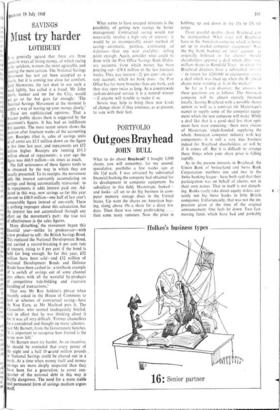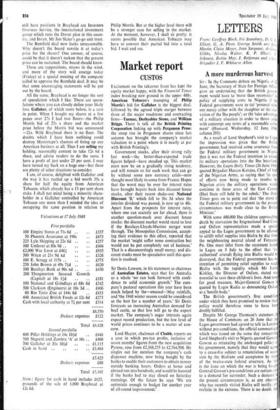Out goes Brayhead
PORTFOLIO JOHN BULL
What to do about Brayhead? I bought 1,000 shares, you will remember, for my second, speculative, portfolio a few weeks ago at lOs lid each. I was attracted by substantial financial backing the company had obtained for its development in computer equipment. Its subsidiary in this field, Mastertape, looked— and looks—all set to do big business in com- puter memory storage discs in the United States. Up went the shares on American buy- ing, rising above 19s a share for a dizzy few days. Then there was some profit-taking . . . then some nasty rumours. Now the price is bobbing up and down in the Its to 13s Gd range.
Three parallel doubts about Brayhead can be distinguished. What stake will Brayhead have in the American company which is being set up to market computer equipment? Was the big bank backing on 'tm it' account :is originally believed or for clients? Should shareholders approve a deal which allots tom million shares to Remfield Trust in which the Brayhead directors have a substantial into-e,t —in return for £200.000 in engineering asscis. a deal which was fixed up when the Br.t■ head shares were standing at 3s in the market? So far as I can discover, the answers to these questions are as follows. The American company will be almost entirely financed locally, leaving Brayhead with a possible shares option as well as a contract (in Mastertape's name) to supply some of the computer equip- ment which the new company will make. While a deal like that is a good deal less than opti- mists here were expecting—there were visions of Mastertape, single-handed, supplying the whole American computer industry with key components—it is still a very nice business indeed for Brayhead shareholders: or will be if it comes off. But it is difficult to arrange these things when your share price is falling rapidly. As to the present interests in Brayhead, the Union Bank of Switzerland and Swiss Bank Corporation--numbers one and two in the Swiss banking league--have both said that their participation was on behalf of clients, not in their own names. That in itself is not disturb- ing. Banks rarely take direct equity stakes, cer- tainly not big Swiss banks in little British companies. Unfortunately, that was not the im- pression given at the time of the original announcement. One feels let down. Two fast- moving funds which have had and probably still have positions in Brayhead are Investors Overseas Service, the international investment group which runs the Dover plan in this coun- try, and Invan, Mr Jim Slater's go-go unit trust.
The Remfield deal now looks unreasonable. Why doesn't the board rewrite it at today's price for the shares? One answer, of course, could be that it doesn't reckon that the present price can be sustained. The board should know.
These are suppositions, straws in the wind, and more of the story will emerge today (Friday) at a special meeting of the company called to approve the Remfield deal. It may be that some encouraging statements will be put out by the board.
All the same, Brayhead is no longer the sort of speculation which I like. There are specu- lations where you can closely define your likely loss. Gallaher, of which more below, is a case in point. When I bought my shares at a few pence over 27s I had two floors—the Philip Morris bid of 25s a share and the market price before the Morris bid was announced —21s. With Brayhead there is no floor. The doubts which I have been outlining could destroy Mastertape's chances of fixing up any American business at all. Thus I am selling my holding, reasonably content to take 12s 6d a share, and advise readers to do the same. I have a profit of just under 25 per cent. I may have turned my back on a huge one—but there are plenty of other situations to consider.
I am, of course, delighted with Gallaher and the way it has rustled up a bid worth 35s a share for half the equity from American Tobacco, which already has a 13 per cent share stake. I shall not mind being a minority share- holder in a Gallaher controlled by American Tobacco any more than I minded the idea of occupying the same position in relation to Valuations at 17 July 1968 First portfolio 100 Empire Stores at 71s 6d .. 50 Phoenix Assurance at 190s 225 Lyle Shipping at 22s 6d .. 100 Unilever at 80s 9d £2,000 War Loan at £461 • • • • 300 Witan at 21s 9d xd • • • • 100 E. Scragg at 115s .. 250 John Brown at 49s 71d 100 Barclays Bank at 90s xd 200 Throgmorton Secured Growth (Capital) at 18s lid 100 National and Grindlays at 68s 6d 500 Clarkson (Engineers) at 16s 3d ..
60 Rio Tinto Zinc at 144s 6d .. 440 Associated British Foods at 12s 6d Cash with local authority at 71 per cent £6,550 Deduct: expenses £122 Total £6,428 Second portfolio 600 Pillar Holdings at 14s 101d .. £446 500 Negretti and Zambra 'A' at 16s .. £400 700 Gallaher at 31s 104d £1,115 Cash in hand £3,464 £5,425 Deduct: expenses £80 Total £5,345 Note : figure for cash in hand includes f625, proceeds of the sale of 1,000 Brayhead at 12s 6d.
•
£357 £475 £257 £404 £935 £326 £575 £620 £450 £181 £342 £406 £433 £275 £514 Philip Morris. But at the higher level there will be a stronger case for selling in the market. At the moment, however, I shall sit pretty: it seems possible that American Tobacco may have to convert their partial bid into a total bid. I wait and see.







































 Previous page
Previous page